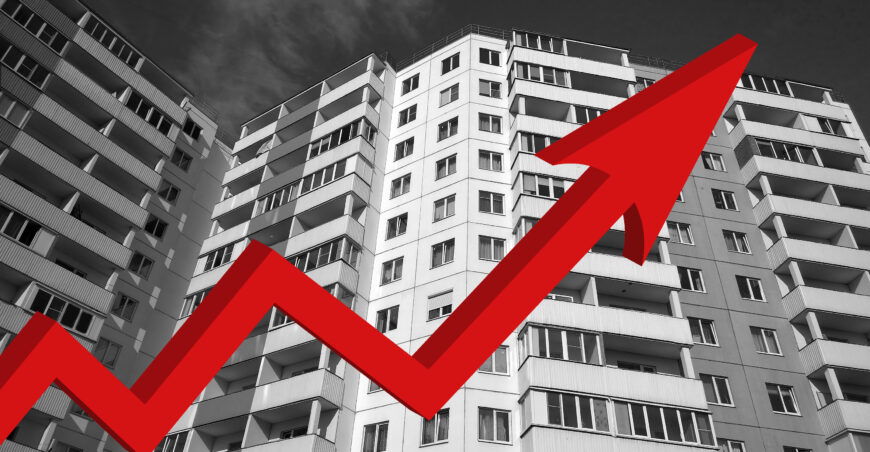In recent years, the global economy has experienced a steady rise in inflation on commercial real estate properties. Inflation is an economic phenomenon that occurs when the general price level of goods and services increases over time. Commercial real estate refers to the property used for business or investment purposes, such as office buildings, retail spaces, industrial facilities, and warehouses.
The rise of inflation on commercial real estate properties impacts commercial real estate in several ways. One of the most significant effects is on the cost of borrowing. As inflation rises, the cost of borrowing money also increases, which means that commercial real estate investors and developers have to pay more to obtain financing. More than 50% of the $2.9 trillion in commercial mortgages will need to be renegotiated in the next 24 months. This increased cost of borrowing can make it more difficult for investors and developers to finance their projects, which can lead to a slowdown in the commercial real estate market.
Inflation Impacts The Demand for Commercial Real Estate
Moreover, inflation can also impact the demand for commercial real estate. As prices rise, consumers have less disposable income to spend, which can lead to decreased demand for goods and services. This decrease in demand can cause businesses to cut costs, including their real estate expenses. As a result, demand for commercial real estate may decrease, leading to a decline in property values and rental rates.
Additionally, inflation can also affect the operating costs of commercial real estate properties. As prices rise, the cost of materials and labor also increases, making it more expensive to maintain and operate commercial real estate properties. This can lead to increased operating costs, which can ultimately reduce the profitability of commercial real estate investments.
Another impact of inflation on commercial real estate is on lease agreements. Many commercial real estate lease agreements contain provisions for rent increases based on inflation rates, Renegotiating a Commercial Lease. As inflation rises, landlords can increase their rental rates, which can lead to increased costs for tenants. In some cases, tenants may be unable to afford the increased rental rates, which can lead to a decrease in occupancy rates.
Inflation on Commercial Real Estate Impacts Business Owners
Furthermore, inflation can also impact the value of commercial real estate properties. As the cost of borrowing increases, investors may demand higher returns on their investments. This can lead to a decrease in the value of commercial real estate properties, as investors are willing to pay less for the same level of income. In addition, rising inflation can also lead to increased interest rates, which can further reduce the value of commercial real estate properties.
The impact of inflation on commercial real estate is not uniform across all property types. For example, properties with long-term leases or those that are leased to tenants with strong credit ratings may be less impacted by inflation. On the other hand, properties that are leased to tenants with weaker credit ratings or those that have shorter lease terms may be more impacted by inflation. Additionally, properties in certain geographic locations may be more susceptible to the impact of inflation than others.
Despite the challenges posed by inflation on commercial real estate properties, there are several strategies that commercial real estate investors and developers can employ to mitigate its impact. One approach is to invest in properties that are less susceptible to the impact of inflation, such as those with long-term leases or those that are leased to tenants with strong credit ratings. Another strategy is to invest in properties in geographic locations that are less impacted by inflation, such as those with lower inflation rates.
Strategies On Reducing Inflation Costs
Commercial real estate investors and developers can also employ strategies to reduce their operating costs. For example, implementing energy-efficient technologies can reduce utility costs, while improving the environmental sustainability of the property. Additionally, implementing cost-saving measures, such as negotiating better contracts with vendors, can also help to reduce operating costs.
The rise of inflation on commercial real estate has had a significant impact on people who are trying to start a business. Increased borrowing costs, decreased demand, increased operating costs, and the impact on lease agreements and property values are just some of the ways that inflation affects the commercial real estate market. However, by employing strategies to mitigate the impact of inflation, commercial real estate investors and
Commercial real estate investors and developers can take several steps to mitigate the impact of inflation on their investments. One key strategy is to carefully evaluate potential investments based on their susceptibility to inflation. Properties with long-term leases or those that are leased to tenants with strong credit ratings may be less impacted by inflation, making them more attractive investment opportunities.
Another approach is to invest in geographic locations that are less susceptible to the impact of inflation. For example, areas with lower inflation rates or those that are less impacted by economic volatility may be more attractive investment opportunities.
Reducing Operation Costs Due To Inflation On Commercial Real Estate Properties
In addition to these strategies, commercial real estate investors and developers can also focus on reducing their operating costs. This can include implementing energy-efficient technologies to reduce utility costs, negotiating better contracts with vendors to reduce expenses, and finding other ways to increase efficiency and reduce waste.
Finally, it is important for commercial real estate investors and developers to stay informed about the broader economic trends and factors that can impact the market. By keeping abreast of changes in interest rates, inflation rates, and other key economic indicators, investors can make informed decisions about when to buy or sell properties, when to renegotiate lease agreements, and how to manage their investments for long-term success.
Overall, while inflation can certainly pose significant challenges for the commercial real estate market, there are steps that investors and developers can take to mitigate its impact and continue to achieve strong returns on their investments. By carefully evaluating potential opportunities, reducing operating costs, and staying informed about market trends, commercial real estate investors can navigate this challenging economic environment and achieve success in the long run.
If you are interested in learning more about 1031 exchange and DST or if you have a property you are looking to exchange and you want to know what your options are, feel free to reach out to us at ICRE Investment Team anytime. We’d be happy to help supply you with information on any relevant properties or markets, alongside any connections in lending, investing, or consulting that you might need!
















